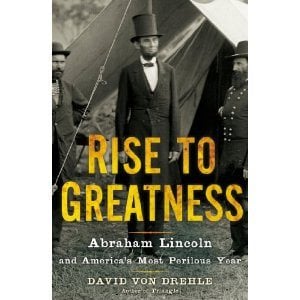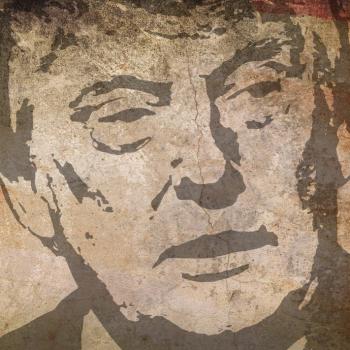 “Never has there been a moment in history when so much was all compressed into a little time,” one US senator aptly observed about the momentous year of 1862. Rise to Greatness looks at Abraham Lincoln’s rise to greatness in the presidency and the tumultuous year that forged his mythic legend. While it’s easy after 150 years to look back and take the outcome of the Civil War for granted, Lincoln didn’t have that luxury when he first took office. In 1862, “the Civil War became a cataclysm, the federal government became a colossus, and the Confederacy came nearest to winning its independence, yet suffered the key losses that led to its doom” (6).
“Never has there been a moment in history when so much was all compressed into a little time,” one US senator aptly observed about the momentous year of 1862. Rise to Greatness looks at Abraham Lincoln’s rise to greatness in the presidency and the tumultuous year that forged his mythic legend. While it’s easy after 150 years to look back and take the outcome of the Civil War for granted, Lincoln didn’t have that luxury when he first took office. In 1862, “the Civil War became a cataclysm, the federal government became a colossus, and the Confederacy came nearest to winning its independence, yet suffered the key losses that led to its doom” (6).
Here’s what modern readers forget about the opening of the Civil War: nothing was assured. The South had a thriving cotton industry that looked to bring in European powers in on the side of the Confederacy. Early victories on the South sent shockwaves through the North, and the North’s lack of military leadership nearly doomed the War in its infancy. At the helm of all this was Abraham Lincoln, a country bumpkin from Illinois, a compromise candidate who shouldn’t have even won office. He garnered no respect among Washington or the Eastern elite. The military leadership mocked him. There seemed at times to be no hope for the North.
And yet, in the midst of the most dire circumstances, a president of mythic proportions rose. Lincoln’s resolve, his political skill, and most importantly, his tenacity to adapt and persevere held the Union together during its most critical phases and established the modern American nation that we know today.
In short, Abraham Lincoln deserves all of the praise he receives today. What modern readers forget, however, is that Abraham wasn’t born a legend. He became one. This book is the story of how he became the legend we know today. For fans of any type of history, this book is an absolute must read.
LESSONS LEARNED
1. Ultimate victory for the North was far from assured in 1862. Europe came tantalizingly close to intruding in the war. Border states such as Kentucky and Maryland were in danger of seceding to the South over slavery (which they still employed). There was open talk in the military of a coup to replace Lincoln with a military dictator. If you saw the outlook for the North in 1862, it would be very grim. Sometimes your greatest victories will seem like pending defeats. Don’t give up; persevere.
2. Lincoln as a leader was ahead of his country and had to patiently help them understand the difference between ‘soft war’ and ‘hard war.’ One of the problems the North lacked in 1862 was a lack of spine. They thought the South would simply roll over and accept defeat. Only after battles such as Fredericksburg and Antietam did they understand that the Civil War would be fought to the bitter end. As a leader, Lincoln could see the unpleasant future on the horizon and did his best to brace the country for it. As a leader, you must see the future and prepare your people to survive and thrive in it.
3. 1862 forged the man of legend that we know today. Reading this book gives hope to anyone aspiring to become a man of Lincoln’s stature. His natural skill was forged through difficult circumstances to produce the man we revere today. If he could make it, there’s hope for you.
4. Lincoln was forced to make the best out of a bad situation. When you begin to understand the scope of the problems that Lincoln faced, your respect for him only increases. One of his paramount problems in 1862 was his chief general (inherited from previous times): George McClellan. McClellan was soft, slow, narcissistic, and at times inept. Yet he had the hearts of his soldiers and could not be fired. Lincoln walked a delicate balancing act with his chief general.
5. Lincoln’s view on slavery evolved over time, as did his leadership. Lincoln did not immediately believe that emancipation of the slaves was the best option. He actually favored a gradual emancipation over a number of years. He also toyed with the idea of a forced expulsion of the slaves to a colony in Central America. Yet over time, his ability to process and grow allowed him to make the fateful decision of his generation: the Emancipation Proclamation.
6. Leadership sucked the life out of Lincoln. He paid the ultimate price in his leadership. Let this be a warning to those who flippantly aspire to leadership. Lincoln’s closest friends noticed how Lincoln’s health suffered dramatically because of the presidency. As we all know, as assassin’s bullet cruelly took his life. There is a price to leadership. True leaders are willing to accept it.
7. Leadership is not meant for all. One of the greatest heartaches that Lincoln had to endure was his wife: Mary Lincoln. Mary was by all means not fit for the rigors and pressures of the presidency. Her scandalous use of White House finances, dabbling in seances to connect with her deceased son and rumored affairs brought untold grief to the President. Some people can withstand the pressures of leadership. Some cannot.
8. Your future has not yet been written. Although God knows all things, you do not. No one at the beginning of 1862 would have believed that Abraham Lincoln would become one of our most revered presidents, the man of myth that he is today. Everyone wrote him off. If God could raise him up for a unique purpose, he can do the same for you. Never underestimate what God could do through your life.











